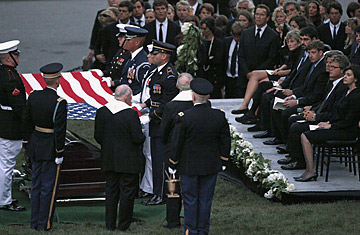
Military pallbearers hold a flag over Senator Ted Kennedy's casket during his burial service at Arlington National Cemetery. Correspondence between Kennedy and Pope Benedict XVI was read at the service
Many American Catholics followed the daylong funeral and burial rites for Sen. Edward M. Kennedy looking for signs of the ongoing struggle between the traditionalist and liberal wings of their Church. The passing of the most notable U.S. Catholic politician of his generation seemed to be a perfect catalyst for such ecclesiastical drama.
Some traditionalists hoped (in vain) that Kennedy, a longtime abortion rights and gay-marriage supporter, wouldn't even be allowed a Catholic funeral. Others hoped (also in vain) that Boston's Archbishop, Cardinal Sean O'Malley, who has declared that voting for pro-choice Catholic politicians "borders on scandal," would sit out the Saturday funeral. Though the main celebrant was former president of Boston College Rev. Donald Monan, a Jesuit and longtime Kennedy family friend, O'Malley was there to give the final commendation at Our Lady of Perpetual Help Basilica.
But what has been one of the most discussed gestures of a tightly choreographed day came at the Arlington National Cemetery evening burial service. Retired Washington Archbishop Cardinal Theodore McCarrick read excerpts from a private letter Kennedy wrote to Pope Benedict XVI — hand-delivered in July by President Obama — and portions of the Vatican response to Kennedy two weeks later. After making no public comment nor authorizing an official communique after Kennedy's death, was the Pope publicly reaching out to this controversial Catholic politician? According to both Vatican and U.S.-based Church officials, the answer is no.
McCarrick himself noted at the brief final rite of committal and prayer that the reading was an idea he and Kennedy's widow Victoria had agreed to, apparently using a copy of Kennedy's letter that the senator had kept. The subsequent response from a papal aide offering Benedict's prayers for his health, according to a veteran ambassador to the Holy See, was likely of a pro forma nature. Such letters are typically handled either by the office of the sostituto, the No. 2 official in the Secretary of State's office or by the Pope's private secretary. "It's very rare to have a letter with the Pope's own signature," says the diplomatic source. In any case, coming in July, it was clearly not a response to Kennedy's death.
The Vatican diplomat said the original copies of all correspondence to the Pope — and a photocopy of the responses — are duly sent to the Holy See archives. Such missives are divided among those of a personal nature from ordinary faithful that are kept in the Pope's personal archives and those of a public or political nature that go into the Vatican's "general" archive. After a certain period of time following a Pope's death, scholars may eventually be given access to the correspondence. The Pope would never reveal the contents of the private correspondence he receives, the Ambassador told TIME.
In this case, thanks to Victoria Kennedy and Cardinal McCarrick, millions of Americans heard directly from such a papal correspondence less than two months after the fact, providing a powerful close to the day of prayer and remembrance. Kennedy wrote to the Pope about his own failing health, as well as his legislative battles on behalf of the less fortunate. And though conceding that he was "imperfect," at least in the portion read aloud, there was no mention of the issues that divided him from Church teaching, like abortion. "I have always tried to be a faithful Catholic, Your Holiness, and though I have fallen short through human failings, I have never failed to believe and respect the fundamental teachings of my faith. I continue to pray for God's blessings on you and on our church and would be most thankful for your prayers for me."
A U.S. Church official said that while McCarrick cleared the reading with the Washington-based papal nuncio (the pope's personal and official representative in the U.s., the equivalent of the Vatican ambassador), "there wasn't any word from Rome. And I don't expect there will be."
Diplomatic protocol doesn't require the Pope to respond to the death of a U.S. senator, either privately or publicly. Still, prominent and well-regarded Catholics often get particular attention. Earlier in August, the day before she died, the family of Kennedy's sister Eunice, who advocated on behalf of the poor, the mentally handicapped and the unborn, received a letter directly from the nuncio saying the Pope was praying for her, her children and her husband. Though the letter was not signed by the Nuncio and not the Pope, it conveyed Benedict's personal greetings: "I wish to convey to all of you, especially to Sargent and to Bobby, Maria, Timothy, Mark and Anthony, the warm greetings and paternal affection of the Holy Father.... His Holiness unites himself spiritually with each of you at this difficult time, holding close to his heart Eunice as she is called home to eternal life..."
"These decisions [about how to react to deaths of public figures] ultimately depend on the Holy Father," says the Vatican diplomat. "There's no fixed rule."
In any event, Cardinal McCarrick's reading of the private letters served a larger Church agenda. "At the funeral in Boston, you had the eulogy of the sitting President, which is impressive, but not really religious," said the Church official. "This way the Cardinal wanted to be sure the day ended as it should, in prayer." And so, the last word as Ted Kennedy was consigned to the earth would be from the Roman Catholic Church.
